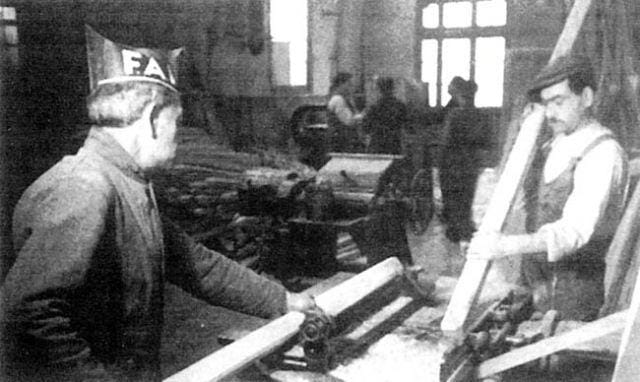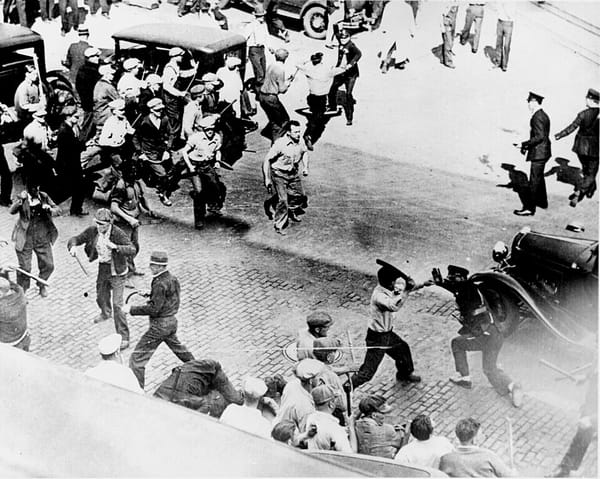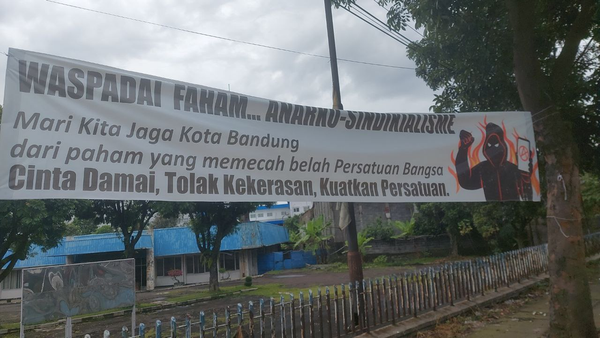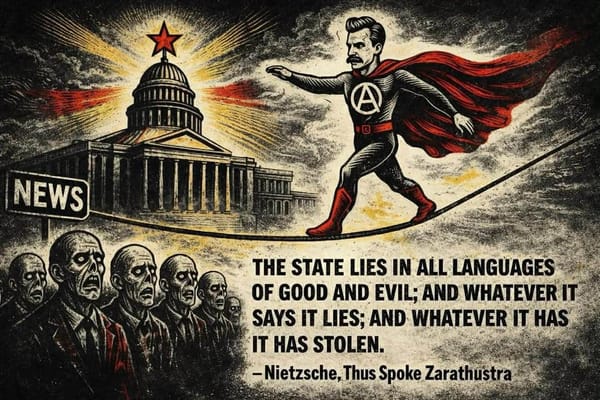What Would Anarchism Look Like?

Most often when proposing Anarchism to people who are not initiated in revolutionary politics the biggest questions said people have relate to how exactly an Anarchist society would function. All parties to the conversation need to accept that spelling out the institutional detail of a society that replaces capitalism is impossible ahead of time. Nobody in Medieval Europe could tell you ahead of time how capitalism would function in institutional detail, and neither could anyone in antiquity ever envision how European feudalism would look in such detail. However, a vision of a new society, if it is to motivate a social movement, needs to be somewhat worked out, and Anarchists as well as other revolutionary socialists have written much on that issue. This article will be a contribution to the working out of the Anarchist vision which will always evolve in the course of the development of the Anarchist movement.
Anarchists are socialists meaning that we affirm the replacement of capitalist society with a society in which all resources and processes of social production, as well as the resulting social product, are under the control of voluntary associations of all the producers. As libertarian socialists Anarchists realize that the creation of such a free and equal society requires the immediate dismantling of all forms of domination and their replacement by forms of free association. Thus, an Anarchist society results from the dissolution of the centralized political structures of capitalist society. In capitalist society the producers are separated from production as a result of its commodification.
Means of production are bought and sold on the market which requires that only those with the capital to invest in production come to legally control the productive processes and resources of human society as well as the product of humanity's social labor. That control is backed up by a hierarchical and coercive entity, called the state. Thus, the state in capitalist society is nothing, but the dictatorship of the bourgeoisie (capitalist class). The working class (proletariat) not having the capital to invest in production is forced to go to work for the capitalist class in order to make a living.
As a result of the Anarchist social revolution the state is dissolved and replaced by non-hierarchical and self-organizing networks of producers' associations. Anarchists propose that these associations be organized on the Anarchist principle of stateless federation. According to this principle various regional associations come together embracing the entire population which collectively make decisions and then elect recallable and rotating delegates whose job is to facilitate cooperation between regional associations. There are thus no more politicians, judges, police, or military. Social life is entirely regulated by networks of voluntary regional associations.
Within regional associations there can be specific producer and consumer councils which are attuned to dealing with production and distribution in different sectors. A geographic cluster of regional associations can be understood as a "commune". The communes, via the principle of federalism, would come together in a world confederation of producers embracing all human populations. There would be no "nations" as a consequence since humanity would be fundamentally united in a multifaceted and pluralistic world culture, rather than being separated into territorial units of culture, ethnicity, and political power.
As the confederation of communes would collectively control production at the world scale such that the producers would reappropriate production and private property would be abolished. Since production and distribution would be collectively regulated by the associated producers it would be subsumed under a rational plan of world-wide productive activity. Contra market Anarchists such as Proudhon, the American individualists, and theorists at the Center for A Stateless Society, goods and services would no longer be produced to be exchanged. The producers would no longer be separate actors producing for private revenue accumulation but will instead be united in a cooperative process of producing and consuming the social product. Libertarian socialism will thus be libertarian communism.
The question everyday people usually are most interested in is the question of how justice is administered in the absence of the state, since in modern society the state is intimately involved in everyone's life. Even in stateless societies (all of pre-history is dominated by stateless societies) there are social sanctions, measures designed to discourage socially negative behavior which range from gossip to killing and exile. Societies ruled by states have legal sanctions, that is sanctions which can only be enforced by a specific group of people (police, military, courts, judges) while societies without states have diffuse sanctions, sanctions which everyone can enforce. The way that defuse sanctions worked in stateless societies was that, with little social stratification, the emphasis was on cooperation and compromise in providing restitution for victims and reforming perpetrators. There were also councils which provided for third party mediation.
In a modern Anarchist society, the focus would be on resolving the social problems that produce socially harmful acts, providing restitution for victims, and making perpetrators better people. Anarchists reject retributive justice, or the idea that justice consists in punishment. For Anarchists the logic of punishment is to multiply socially negative effects, rather than to reduce them, since the point of punishment is to hurt those who hurt others or hurt society. Justice at the societal scale would be implemented by the various producers' associations at the level of communes and ultimately at the level of global confederation.
There is the question of how libertarian communism will allocate resources and organize social labor. The point of production under communism is the fulfillment of the needs of the associated producers. Included in "needs" are the need for fulfilling life activity which brings joy to human beings, so need in this sense is not just subsistence. Resource allocation is not the result of technocratic tradeoffs in conditions of scarcity. Rather there is a seamless process of producers pursuing their interests and in so doing expanding the productive infrastructure necessary to create resource abundance. Natural disasters, accidents, and transitory limitations on productive technologies would be dealt with through voluntary agreement among the involved producers and consumers which maximize the overall social utility of scarce resources with a view toward industrial expansion that reduces such scarcity.
Industrialization in a communist mode of production would be inherently different than industrialization in the capitalist mode of production. Under capitalism industrial development is directed toward extending the working day and making work more intensive. Under communism it is directed toward shortening the working day and making labor less onerous. Under capitalism industrial development increases wealth inequality overtime whereas under communism it would universalize access to material wealth.
Capitalist society is known for its division of labor where production is broken down into different tasks and functions which different people with different levels of specialist knowledge carry out. It is the secret of modern culture wars that discrimination along the lines of race, sex, sexuality, gender identity, nationality, ability, and age exist to justify the slotting of some groups of people into the less socially rewarding roles in the division of labor. Communism would eradicate the division of labor. Productive labor would no longer be divided into different tasks which producers have to dedicate the vast sum of their training and time to. There would also not be social stratification around what kind of tasks one carries out and thus racism, sexism, queerphobia, ableism, xenophobia, and ageism disappear.
Instead access to training would be universalized as far as possible and barriers to entry minimized allowing for a productive life in which producers can constantly move between different occupations. As such the division between mental and manual labor which makes it so that only a narrow part of the population with the requisite financial resources spends its time thinking about humanity's big questions about the nature of the world and the good life would also dissolve with producers moving between physical and intellectual pursuits as they see fit. Capitalist industrial development has made it, so the academic world is divided between the humanities and the sciences. On the one side is the scientific study of nature which tries to understand the world in terms of impersonal empirical observation and on the other pursuits in the arts and philosophy which are uniquely concerned with the subjective and personal dimension of human life.
Social science is caught in the middle with some social scientists demanding that social science adopt the impersonal methodology of natural science while others insist on the need to examine human life from a personal and subjective perspective. This "two culture split" is the result of the capitalist world-economy's need for a standardized empirical field of research which lays the basis for intellectual management of industry and the state bureaucracy, since capitalist politics and production are built on sidelining personal and subjective concerns and centering the objectification of human life via the transformation of all social wealth into a mass of commodities.
With the abolition of profit and its underlying commodity form (and thus the abolition of "the economy" as an international network of buying and selling) and a mode of production for meeting human needs in all their subjective complexity the two-culture split would cease to be relevant. Natural science, social science, philosophy, and the arts would all merge into one developing body of practical human knowledge. In pre-capitalist societies religion fulfilled the social function of offering an explanatory framework that made sense of natural phenomena. When capitalism provided the productive basis for the enlightenment and scientific revolution it allowed for the construction of a modern scientific worldview in which natural phenomena are understood in terms of their internal regularities and dispositions. The social function of religion thus transformed from one of explaining the natural world to filling an otherwise disenchanting existence with meaning.
Nietzsche's death of God describes a situation in which the supernatural and spiritual lose their ontological and moral centrality. This fact is horrifying because it seems to dismantle human significance and the meaning of human life in the universe. According to Karl Marx and classical Anarchists such as Mikhail Bakunin, the death of God is horrifying, rather than liberating, because human beings are still estranged from control over their own material circumstances on account of the exploitation of labor in class society. This estrangement means that human beings are barred from seeing the significance of the natural order for the meaning of their lives leading them to seek salvation in the supernatural.
When all human beings are put in full control of their material circumstances, they necessarily come to recognize nature as the basis for their life activity allowing for a naturalistic ethic of human freedom in which human beings autonomously construct meanings for our lives on the basis of fulfilling productive activity. This led Marx and Bakunin to believe that a communist mode of production would see the dissolution of religion. The end of human estrangement from nature in a free technological modernity means that religion ceases to have either an explanatory function, or a meaning making function. Since these are religion's most significant purposes religion would cease to have a social function and would go the way of the pantheons of Babylon, Greece, and Rome. Since this would be a spontaneous result of social transformation the disappearance of religion would be compatible with freedom of conscience and belief.
The end of human estrangement from nature also means the repairing of the metabolic rift between humanity and the ecosystem. Under capitalism nature is a mere pool of resources separated from humanity itself, since the imperatives of profit make the collective management of humanity's relationship to nature costly. Under communism humanity becomes collectively and mentally integrated with nature to allow for the collective and intentional transformation of the ecosystem in accordance with the large scale and long-term needs of sentient life. Thus, productive infrastructure under communism becomes wedded to goals of sustainability (i.e. ensuring our natural environment remains habitable for life), whereas under capitalism productive activity directed by the capitalist class and rich nations is rapidly degrading the life-supporting capacities of the ecosystem.
Under communism there will be no first and third worlds. The capitalist world-economy requires the extraction of less expensive raw materials to produce more expensive finished products for sale. Staple goods like food are also naturally less expensive than luxury goods, or "preciosities". That means the industrial and financial centers of the world-economy need to buy raw materials and staple goods from the peripheral zones which allow the production of finished consumer goods and preciosities. This all means that the profits reaped from economic activity in the peripheral zones will be dramatically reduced compared to those reaped in the core. This has led historically to the chronic underdevelopment of regions of the world which were conquered by western imperial powers, a phenomenon known as "unequal exchange".
With the abolition of commodity production and production for meeting social needs in its place, the social wealth of the global south will be repatriated and expanded, ending global poverty. Capitalist industry presupposes an urban/rural divide where agriculture is a separate sphere from industry since industry leads in terms of profitable production processes meaning that agriculture is reduced in comparison to industry as industrialization proceeds. In communism the urban rural cleavage will close with agriculture and industry hybridizing according to the needs of voluntary producer and consumer associations. The federal communes of libertarian communism will thus transcend purely urban and purely rural living.
Anarchism is the ultimate program of decolonization. The modern state only exists as a result of an ongoing process of extermination and subjugation of indigenous people. Today indigenous people are relegated to a "fourth world" occupied by the political institutions of their conquerors and are thus denied self-determination. The dissolution of all states means the free and equal participation of indigenous populations in institutions of global social organization on their own terms. The federation of producers communes thus guarantees indigenous self-determination and autonomy.
If one finds this vision of a new world compelling, then one has a strong reason to sign up to the Anarchist project. However, there is a further question of how Anarchists move society from capitalism to libertarian communism. Since Anarchists oppose centralized and hierarchical political institutions Anarchists cannot rely on political parties and state power to get what we want. Anarchists for the most part, thus advocate Anarcho-Syndicalism as the method of social transformation.
Sources
World-Systems Analysis: Very Short Introduction, Wallerstein
The Conquest of Bread, Kropotkin
Statism and Anarchy, Bakunin
God and The State, Bakunin
Anarchy, Malatesta
Critique of The Gotha Program, Marx
Karl Marx and Friederick Engels on Communism, Chattopadhyay
World Past to World Present, Stearns
Understanding Marxism, Boucher
Uncertainties of Knowledge, Wallerstein





